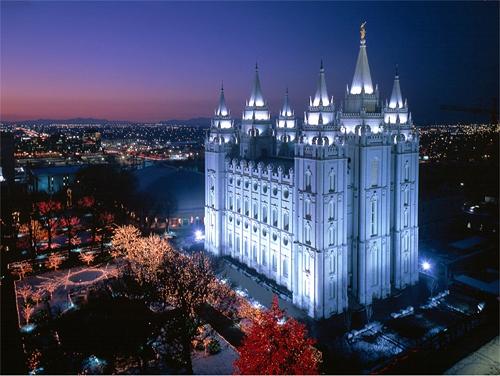The law and the prophets were until John: since that time the kingdom of God is preached, and every man presseth into it (Luke 16:16).
 Luke 16:16 is one of several Biblical passages interpreted to mean that there will be no more prophets after John, who baptized Jesus. It is also one of the more widely used scriptures to refute the claims of the Mormon Church. Mormons claim that Joseph Smith had a prophetic calling, as did subsequent prophets to the present day. Some enemies of the Church say this claim contradicts the Bible because of Luke 16:16. Mormons contend that it is a misinterpretation of the scripture, beginning with a misunderstanding of the phrase, “the law and the prophets.”
Luke 16:16 is one of several Biblical passages interpreted to mean that there will be no more prophets after John, who baptized Jesus. It is also one of the more widely used scriptures to refute the claims of the Mormon Church. Mormons claim that Joseph Smith had a prophetic calling, as did subsequent prophets to the present day. Some enemies of the Church say this claim contradicts the Bible because of Luke 16:16. Mormons contend that it is a misinterpretation of the scripture, beginning with a misunderstanding of the phrase, “the law and the prophets.”
The Law and the Prophets
“The law and the prophets” is mentioned several times in the Bible. This should be understood as synonymous with “the scriptures.” The sacred writings used as scripture by the Jews of Jesus’ day were generally the same as the books of the Old Testament. The “law” refers to the five books of Moses, or the Pentateuch–Genesis, Exodus, Leviticus, Numbers, and Deuteronomy. Contained in these books is the Law of Moses given to the children of Israel. Paul has stated that the purpose of this law was to be a schoolmaster to lead them to Christ (Galatians 3:24). The “prophets” refers to the historical and prophetic books now included in the Old Testament– the historical books from Joshua to Esther, and the prophetic books from Isaiah to Malachi. The purpose of these prophesies was to anticipate the coming of the Savior. Also included in the Old Testament are “the writings.” These are the poetical books such as Psalms, Proverbs, Ecclesiastes, and Song of Solomon. These books were not standard inclusions in the scriptures of Jesus’ day, but were known, as Jesus refers to them in Luke 24:44. Their purpose is also the same; they profess the glory of the Lord and His love for His people.
When Jesus says in Luke 16:16, that the “law and the prophets were until John,” Mormons do not believe that this means there is no more law and no more prophets, John was just the last prophet to precede the coming of Christ; as Jesus said, the law and prophets, meaning the scriptures, will not be destroyed, but fulfilled (Matthew 5:17). As the prophets foretold, and the law symbolized, the Son of God was now in the world preaching a new covenant to His people, and would soon sacrifice Himself for the sins of all. With that sacrifice, all that the law had pointed toward would be completed; all that the past prophets had spoken of would be accomplished. From that point on, the law and the prophets did not anticipate the coming of Christ, for He had already come, and established a new covenant. Now the preaching was of Christ, who had already come, and the gospel He set forth.
Prophets after Christ
Perhaps a fundamental issue in the interpretation of Luke 16:16 is the definition of a prophet. What is a prophet or prophecy? As stated before, one definition not clearly understood is the use of “prophets” in the New Testament to mean scripture. Surely the Lord did not mean there would be no more scripture, for none of the New Testament had been written at that point. Another potential misunderstanding could be in thinking of prophecy as predicting the future. If this is true, then it is understandable why some would see no more need for prophets. Old Testament prophets spoke of the Lord coming at some future date. As is written in the epistle to the Hebrews– GOD, who at sundry times and in divers manners spake in time past unto the fathers by the prophets, Hath in these last days spoken unto us by [his] Son, whom he hath appointed heir of all things, by whom also he made the worlds (Hebrews 1:1-2). It is quite a leap of deductive logic to assume that because Jesus spoke of Himself, the need for prophets is over. Again, it may be linear thinking underlying this. The need to foretell of His coming is certainly over, but if prophets are defined as those speaking for the Lord, than the need for them will never cease. This is precisely what Mormons believe the duty of a prophet is. Before the Lord had come, those that foretold of Him were called prophets and so the association of future telling came to be. However, more important than the time of the events, was the truth of the events, and this is what Mormons see as the crucial role of a prophet–to testify of truth.
Since the time of Jesus, believers have historical evidence (including the New Testament) to rely upon for understanding and don’t need a living spokesman foretelling future events. Perhaps it is this trait of people to believe it when they see it that made the Law of Moses their schoolmaster, and the prophets into future-tellers. For them to believe the law and the prophets, this was necessary. Now that mankind has seen Christ, and it is part of history, the Mormon view is that people now reject the prophets as unnecessary, citing Luke 16:16, among other scriptures, to justify it. But Mormons believe that, in His day, Jesus called twelve apostles and other leaders to testify of Him, preach the gospel, and administer to the churches that were forming and gathering many converts. Those apostles stood in a position between God and mankind, just as prophets of old had. They spoke with authority and on behalf of God, and those who heard were held accountable. Jesus said of His followers, Verily, verily, I say unto you, He that believeth on me, the works that I do shall he do also; and greater [works] than these shall he do; because I go unto my Father (John 14:12). This does not indicate that prophecies and miracles have ceased, but the reverse. Indeed, after the ascension of the Lord, the apostles performed miracles, received revelation, and prophesied. The spirit of prophecy is one of the gifts mentioned by Paul as to be sought after by the followers of Christ. In this sense, a prophet is one who speaks by  the spirit of prophecy, which is the testimony of Jesus (Revelation 19:10).
the spirit of prophecy, which is the testimony of Jesus (Revelation 19:10).
Mormons believe that the organization set up by Jesus is the same today. The Mormon Church is organized after the same manner, with a prophet and quorum of twelve apostles as its leaders. These apostles act as prophets under the new covenant the Lord issued during His ministry. They speak the will of the Lord as prophecy. In Luke 16:16, when Jesus said the law and the prophets were until John, he spoke of the old covenant with the children of Israel, represented by the scriptures until that day. Since then, there is a new covenant, and new scriptures, and a new law, and new prophets.
